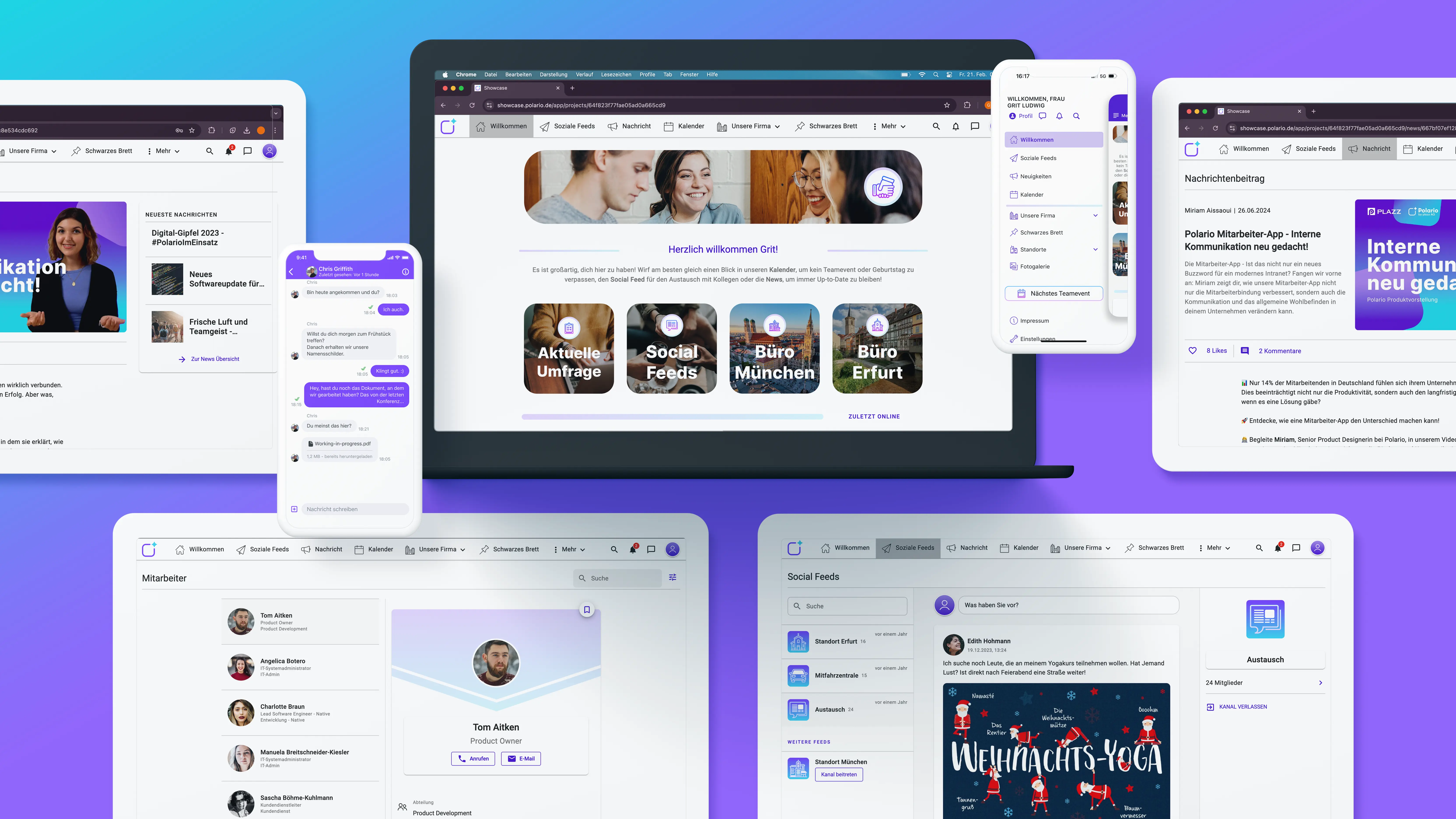The competition for talent is more intense than ever – companies not only need to recruit new employees, but also retain them in the long term. A strong employer brand is the key to this. But the reality is different: 65% of SMEs do not have a clear employer branding strategy, according to the Employer Branding & Recruiting Study 2024 by Die Schätzefinder.
The problem? Without a strategy, there is no identity as an employer. If values, culture and development opportunities are not clearly communicated, talent will quickly leave. In fact, 44% of companies cite a lack of promotion opportunities as the main reason for employee turnover. And this is precisely where employer branding is often underestimated: it’s not just about recruiting, but about employee retention, corporate culture and genuine commitment.
If you want to score points as an employer in the future, you need to offer more than just a fruit basket and a table football table. Digital solutions such as employee apps can help to bring corporate values to life, improve communication and strengthen employee loyalty.
How does modern employer branding work? Which measures really help? And why are digital tools the game changer? In this article, you’ll find the answers – compact, practical and to the point.
Employer branding definition: Why is it so important?
Employer branding describes the strategic process by which companies build an attractive and authentic employer brand. The aim is to inspire both existing and potential employees in order to attract and retain the best talent for the company in the long term. It is not just about the external image, but also about creating a corporate culture in which employees feel valued and motivated.
Employer branding vs. personnel marketing vs. recruiting - what's the difference?
These terms are often used interchangeably, but have different meanings:
-
Employer branding
Long-term strategy to position the company as an attractive employer. Focus on corporate culture, values and long-term employee retention.
-
Human Resources Marketing
Short-term, targeted measures to attract qualified candidates for vacancies (e.g. social media ads, career fairs, recruiting events).
-
Recruiting
The actual selection process, from the job advertisement to the hiring of new employees.
Internal vs. external employer branding: Two sides of a strong employer brand
Internal employer branding
Internal employer branding focuses on existing employees in order to promote satisfaction, commitment and loyalty.
Measures:
- Actively shaping corporate culture
- Offer employee development & further training
- Create recognition & benefits for employees
- Optimize internal communication (e.g. through employee apps)
External employer branding
The focus of external employer branding is on positioning the company as an attractive employer for potential talent.
Measures:
- Optimize career pages and social media presence
- Targeted employer branding campaigns
- Provide authentic insights into the company (e.g. via employee testimonials or behind-the-scenes content)
- Active evaluation management on platforms such as Kununu & Glassdoor
The Employer Value Proposition (EVP) - The heart of a strong employer brand
The Employer Value Proposition (EVP) is the foundation of successful employer branding. It defines what a company offers its employees and why talented people should choose this particular employer. A convincing EVP not only makes the company stand out in the competition for skilled workers, but also ensures long-term employee loyalty and greater satisfaction within the team.
What does a strong EVP need?
-
Corporate culture & values:
What vision, mission and culture characterizes the company?
-
Remuneration & benefits
Attractive salaries, additional benefits & work-life balance offers
-
Career & development prospects
Further training, internal promotion opportunities & mentoring
-
Working environment & flexibility
Modern working environment, remote options & flexible working hours
How companies develop an authentic EVP
An EVP is not an advertising message – it must be authentic, realistic and sustainable. Companies should see their EVP not just as an external communication tool, but as a genuine promise to their current and future employees. This is how to develop a convincing EVP:
Taking the employee perspective
The best answers to the question “What makes our company unique?” come from the employees themselves. Managers and HR should take a close look at the employee experience. Possible methods:
- Employee surveys & feedback sessions → What is valued, what is missing?
- Exchange with managers & teams → Which values and promises can be realistically kept?
- Analysis of employer ratings → Where is there potential for optimization?
Clear message and differentiation
An EVP should express in a few concise sentences what makes the company special as an employer. This includes:
- Clear positioning: Why should an applicant choose exactly this company?
- Differentiation from the competition: What unique advantages are there that others do not offer?
- Honest communication: No “buzzword bingo”, but an EVP that is truly reflected in the corporate culture.
Bringing EVP to life & communicating it consistently
A well-formulated EVP is useless if it is not put into practice. The EVP must be reflected in all areas of the company, from internal communication to external impact:
- Integrate into job advertisements and career pages → The EPP should be clearly communicated in job offers.
- Involve employees as brand ambassadors → Authentic insights through real stories and testimonials.
- Adapt internal measures → From further training to flexible working models - the EPP must be tangible in everyday working life.
Important measures for successful employer branding
Strong employer branding does not just happen on its own – it requires a targeted strategy that works both internally and externally. Employees need to feel the employer brand before it can be communicated credibly to the outside world. Employer branding measures can therefore be divided into two central areas:
- Internal measures → Strengthening the corporate culture & employee loyalty
- External measures → Increase visibility as an attractive employer
Internal measures: Employer branding starts with the employees
A strong employer brand starts within the company itself. Employees are the best brand ambassadors when they feel valued and truly live the company values.
Strengthen corporate culture & involve employees
Corporate culture directly influences how committed, productive and loyal employees are. Employers should therefore:
- Formulating & living clear corporate values - not just on the website, but in everyday life
- Obtain regular employee feedback - e.g. through surveys or open discussions
- Build a strong community - e.g. through team events, mentoring programs & digital networking
Corporate influencers: employees as brand ambassadors
People trust people – not advertisements. That’s why employees are the most credible representatives of the employer brand.
- Actively involve employees in social media content (e.g. share insights into everyday working life)
- Celebrate internal successes & communicate them externally
- Encourage employees to share their experiences on LinkedIn & Co.
Open communication & transparent corporate values
Employer branding only works if the internal values match the external communication. Transparency and open communication are essential:
- Regular updates & transparent decisions (e.g. via employee apps)
- Communicate clear career prospects & development opportunities
- Establish an honest error culture & feedback culture
External measures: Making employer branding visible to the outside world
In addition to a strong internal employer brand, it is also essential to communicate this to the outside world in a targeted manner. Today, applicants gather information via many channels – a convincing appearance is crucial.
Using social media as an employer branding tool
LinkedIn, Instagram, TikTok & Co. are not just marketing platforms – they are essential channels for employer branding.
- Share employee stories & behind-the-scenes content
- Active presence on LinkedIn to be visible as a thought leader
- Use career content on TikTok & Instagram for the young target group
Optimize job ads & career site
The careers page is a company’s digital business card – it has to be convincing.
- Simple application process & mobile-optimized website
- Obtain honest employee feedback & implement improvements
- Actively promoting positive employee experiences

Employee apps as the key to a strong employer brand
A strong employer brand is not only created through external presentation – employer branding starts internally. Companies that promote an open, transparent and appreciative corporate culture retain employees in the long term and strengthen their image as an attractive employer. Employee apps are a key tool for improving internal communication, promoting commitment and bringing corporate values to life.
Why internal communication is crucial for employer branding
A company can offer attractive benefits – but if internal communication doesn’t work, the employer brand suffers. Clear, fast and transparent communication creates a strong sense of community and a positive working environment. This not only has an impact on employee satisfaction, but also on how companies are perceived externally.
- Informed employees are motivated employees - those who know about company developments feel involved.
- Good internal communication reduces fluctuation - employees who feel heard stay with the company longer.
- Employer branding works from the inside out - Satisfied employees authentically convey a positive employer brand to the outside world.
How employee apps promote transparency & engagement
In many companies, information is often difficult to access, meetings take up a lot of time and internal communication takes place via unstructured emails. Employee apps solve precisely these challenges and create a transparent, efficient and interactive communication culture.
- Fast & direct communication - Important company news reaches employees in real time.
- Integration of all employees, also remote & mobile - particularly valuable for decentralized teams.
- Promoting a feedback culture - surveys & interaction opportunities strengthen commitment.
Functions & advantages of an employee app
A modern employee app is much more than just a digital bulletin board – it brings employers and employees closer together and makes communication interactive. The most important functions at a glance:
-
Company news, department information or CEO updates reach all employees immediately - no matter where they work.
-
Employees can express their opinions on processes, changes and corporate culture anonymously or openly.
-
New employees can quickly familiarize themselves, fill out forms digitally and find their way around the corporate culture.
-
Gamification elements, internal challenges or social walls for employees strengthen the sense of togetherness.
Conclusion: Employer branding is a must, not a trend
Attracting and retaining talent is becoming increasingly challenging. Companies that do not actively invest in their employer brand are becoming less attractive – both for applicants and existing employees. A strong Employer Value Proposition (EVP) is essential, but only effective if it can be felt in everyday working life.
Employer branding starts internally. Actively involving employees, promoting an open corporate culture and transparent communication creates an authentic employer brand. At the same time, external perception is crucial: social media, career sites and review platforms are often the first point of contact with potential applicants. Companies that are visible and authentic here stand out from the competition.
Modern technologies such as employee apps support this process by strengthening internal communication, facilitating feedback and promoting a positive corporate culture.
Employer branding is not a one-off campaign, but a strategic investment in the future. Acting now not only attracts the best talent, but also strengthens the company’s long-term success.
You might also be interested in

Improve communication in your company: Follow these 10 strategic steps for effective internal communication.

Focus on strong employee retention: Increase productivity & reduce staff turnover with proven employee retention strategies.


